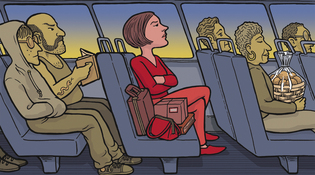 loading
loading
FindingsGuarding your personal bus spaceWhat riders do to avoid sharing a seat.  Gregory NemecView full image
Have you ever placed a bag on the seat beside you on the bus, to discourage would-be seatmates? Even feigned sleep, so nobody would ask you to move it? Esther Kim ’12PhD recently studied how far people will go to ward off company on a bus. Over two and a half years, she took many long Greyhound trips, taking notes and talking with other riders. She found that the silent, seemingly passive passengers were making a constant, active effort “to avoid others by privatizing public spaces.” Kim named this effort “nonsocial transient behavior.” In the journal Symbolic Interaction, Kim details “how strategic and calculating people are” in using “their bodies and belongings to form a barrier.” She observed some people who tried to make the seat next to them look occupied, some who pretended to sleep, others who avoided eye contact, and still others who pretended to be talking on their cell phones. Some riders even feigned mental instability. One woman told Kim, “If I have to pretend to be crazy for five minutes to get the row to myself, it’s worth it.” When a bus starts to fill and riders are told to make all seats available, Kim notes, “the new goal becomes sitting next to a ‘normal’ person.” The important concerns for avoiding discomfort were personal traits such as hygiene and personality. Interestingly, to this end, race, class, gender, and other such identifiers didn’t matter.
The comment period has expired.
|
|